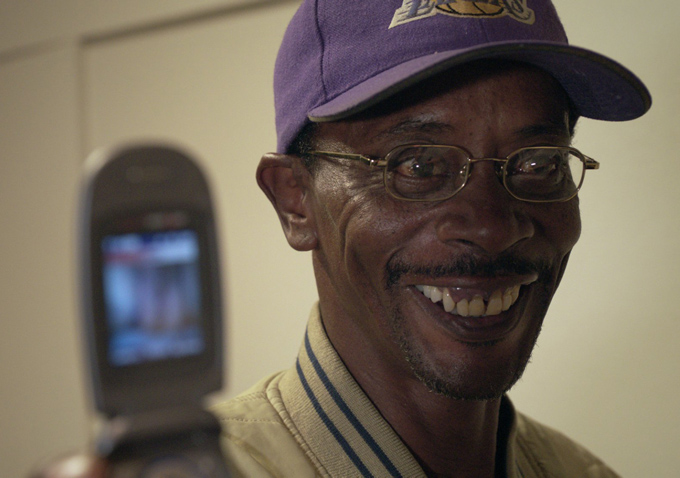 Nick Broomfield’s new documentary is a little bit "Dateline," a little bit Ferguson. "Tales of the Grim Sleeper" offers up the identity of the titular serial killer in the opening minutes, but it still revolves around a whodunit. Or, really, a who-didn’t-do-anything, since the movie’s central mystery is why the LAPD took decades to find a killer believed to have murdered dozens (maybe hundreds, Broomfield suggests) of african-american prostitutes over a 25-year period in perpetually troubled South Central L.A.
Nick Broomfield’s new documentary is a little bit "Dateline," a little bit Ferguson. "Tales of the Grim Sleeper" offers up the identity of the titular serial killer in the opening minutes, but it still revolves around a whodunit. Or, really, a who-didn’t-do-anything, since the movie’s central mystery is why the LAPD took decades to find a killer believed to have murdered dozens (maybe hundreds, Broomfield suggests) of african-american prostitutes over a 25-year period in perpetually troubled South Central L.A.
The likeliest answer to that puzzle of apparent police inaction may be so self-evident as to not generate much suspense. But Broomfield still has a knack for keeping audiences grim and alert, thanks to an inexhaustible ability to find indelible characters to put on screen. ‘Grim Sleeper’ ultimately turns out to be less about ineffectual policing in the African-American community —although that angle is clearly more relevant than ever at the moment— than it is about the heart-rending sadness of the crack-based prostitution economy, and even the pathos of “john” culture, such as it is.

Even the very nickname that law enforcement officials gave “the Grim Sleeper” would seem to indicate a lapse their part, since the killer was referred to as a “sleeper” because it was believed he’d taken a long break between murder sprees. In fact, he appears to remained active from the beginning of his known spree in 1985 through the 2010 capture of Lonnie Franklin (who’s still awaiting trial). The closest thing to a hero in Broomfield’s narrative is Margaret Prescod, leader of a group called the Black Coalition Fighting Back Serial Murders, who tried to put the pieces together and keep the community vigilant about the presence of a predator in their midst, but without much success. She’s seen politely disrupting the eventual press conference held by L.A.’s mayor and chief of police to announce Franklin’s arrest. No one involved on the legal side would agree to an interview with Broomfield, which might be the smartest move any of them pulled when it came to any aspect of the case.
Wisely, Broomfield doesn’t harp on alleged police incompetence, beyond letting a handful of activists and locals repeatedly raise it as an issue; ‘Tales’ is far from overbearing as far as agitprop goes, letting the outrage quietly seep in. Broomfield only needs to let Prescod raise the question of what would have happened if these victims had lived in Beverly Hills once to get the point made. At the same time, most of the women went unmissed and unlamented in their own neighborhood, and the filmmaker’s interviews with an unending parade of streetwalkers and their customers should make viewers just as angry about the human toll of the oldest profession in the world. These “girls” are so self-aware and often funny that, when one of them finally breaks down on camera toward the close, the effect is unexpectedly gobsmacking.

Not every documentary fan cares for Broomfield’s imperious tone and tendency to inject himself into the tales he tells, but if anything, he probably could have made more of his own nervy effort to integrate into one of L.A.’s most dangerous communities. Footage of some local men angrily yelling across the street at this “peckerwood” to get out of their community is immediately followed by Broomfield approaching the men for a front-porch interview, which leads to this Greek chorus of guys becoming fascinating characters throughout the film in their own right, as they eventually admit they knew a lot more about Franklin’s sexual sociopathy than they first let on. It might be stretching it to say that Broomfield’s relationship with his subjects counts as a “can’t we all just get along” moment, but it’s hard to imagine any other Anglo filmmaker getting quite this embedded in South L.A. Given the dry tone he employs throughout the interviews and voiceover, it’s still hard to imagine quite how he did it, except that maybe he earned some respect for not even trying to adopt a homeboy familiarity.
The end result is a good deal of respect for the locals who’ve found ways to survive in neighborhood riddled with gunfire… but also some fear you might feel of folks like Franklin’s grown son, who agrees to an interview near the end of the film and establishes that the sins of the father really are passed on. Would you prefer to be more outraged by the legacies of sexual predation or police indifference? Broomfield lets you take your pick. [B+/A-]
Browse through all our coverage of the 2014 Telluride Film Festival to date by clicking here.


